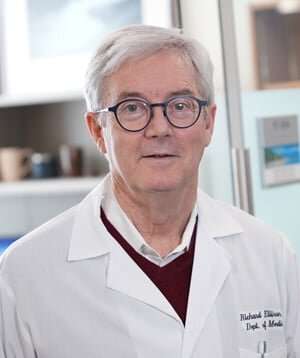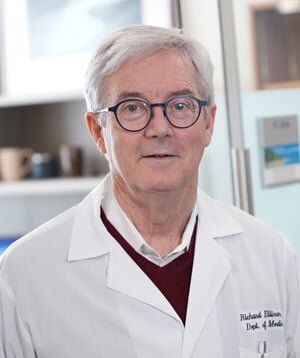
More than two years since the COVID-19 global pandemic began, the SARS-CoV-2 virus continues its rampage through rapidly evolving mutations and gaps in population immunity. But the outlook for managing COVID-19 is brighter than in those first dark days of 2020, according to infectious disease specialist Richard T. Ellison III, MD, professor of medicine and hospital epidemiologist at UMass Memorial Medical Center.
“We’re in a very good point in that most people in the United States have now been vaccinated or may have actually had COVID before, so there is a lot of immunity to serious disease,” Dr. Ellison said.
“Having said that, this is a virus that is all over the world. Some people are immune-suppressed, or their immune system is not that strong, and they can have an infection for prolonged time periods. And that allows the virus to change and mutate. Not as many people are getting sick, but this virus keeps evolving into variants that are spread very, very easily.”
At least two variants have emerged worldwide since the omicron strain took over from delta in December.
Hospitalizations down
According to Ellison, the number of people in the hospital locally and particularly in the intensive care unit who have COVID-19 has decreased from previous surges. And about half the people hospitalized with COVID-19 were admitted for another reason, such as kidney stones or a heart attack. Hospital personnel have to take full precautions to prevent spreading infection among patients and staff regardless of when the infection was identified prior to admission.
“So, it requires the hospital to be very careful and still require everyone to wear masks, gowns and gloves—the personal protective equipment that was in such short supply two years ago,” said Ellison. Safety glasses, which have been associated with lower risk of transmission, have become standard.
To compound matters, many doctors and nurses are absent from work because they caught COVID-19 in the community, at a family gathering or going to a restaurant, for instance, which Ellison said is affecting hospital care.
Therapeutics and ‘Paxlovid rebound’
Therapeutics, including the antiviral drug Paxlovid and monoclonal antibodies, “really do make a difference” in reducing symptoms and keeping people from going into the hospital, said Ellison. He encouraged people who are 65 or older or have health problems to contact their physician as soon as they test positive to start a course of treatment.
Recent media attention has focused on some people whose infection went into remission following a five-day treatment with Paxlovid, even showing negative test results, but then symptoms returned after treatment ended, a situation termed “Paxlovid rebound.”
Ellison said small numbers of people experienced recurring symptoms in clinical trials of the drug, but overall, “Paxlovid is great in getting a lot of people to recover, and certainly in terms of preventing people from going into the hospital, from going into the intensive care unit and preventing people from dying.” Five days of treatment may not be enough to completely eradicate the virus in some people, so they get symptoms a second time, he said.
Booster shots
The U.S. Food and Drug Administration authorized a second booster of the Pfizer-BioNTech and Moderna vaccines in the spring for those who are age 50 or older, or who are 12 or over with certain kinds of compromised immunity, and who received a first booster shot at least four months earlier.
Ellison said that because those populations face waning immunity, a second booster is “definitely worthwhile.” But for a younger, generally healthy population, “The relative risks and benefits of the second booster vaccine don’t really suggest everyone needs to get it.” He emphasized the importance of a first booster for all who have been vaccinated.
While some people wonder whether they will have to get a booster shot every few months to keep up with emerging virus strains, Ellison said advances are on the horizon.
Phase II/III clinical trials taking place now, including one for Moderna led by Jennifer Wang, MD, professor of medicine, explore different configurations of a bivalent vaccine that covers the original spike protein and the beta variant spike protein. Researchers hope these reworked vaccines will provide a broader shield against new mutations.
Ellison said scientists are working to develop a single vaccine that would protect against influenza and SARS-CoV-2, so that people might get an annual combined shot instead of separate inoculations.
Isolation, testing and mask guidelines
Meanwhile, policy recommendations have evolved regarding how people can stop the spread of COVID-19. The CDC recommends that people with confirmed or suspected COVID-19 isolate for at least five full days. After five days and following 24 hours fever-free without use of fever-reducing medication, a person who has been sick may end isolation but should still wear a mask around others and monitor symptoms until at least day 10.
Source: Read Full Article
